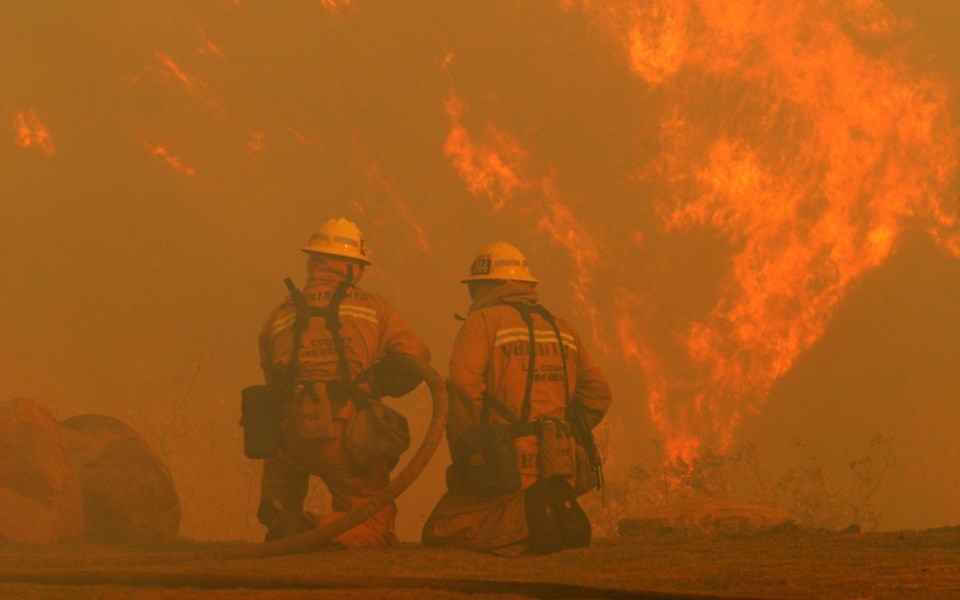The wildfire in Squamish last week was a bit of a shock.
After all, we still have snow in the valley here and just a few days ago, we were putting on our wellies to head outside.
That wasn't even the only wildfire blazing in B.C. this week. Two new human-caused wildfires broke out on Sunday in the B.C. Interior. A six-hectare blaze is burning at Nooaitch along Highway 8 near Merritt, while another is burning along Highway 8 near Spences Bridge. The nearby Agate Creek fire is still considered active as well.
Twenty-three fires have burned across B.C. so far in 2019, scorching 89 hectares of land.
The last two summers were the worst wildfire seasons on record and both resulted in a provincial state of emergency being declared.
Many experts would argue that having a third would be highly unusual but they are not ruling it out.
University of Alberta professor and wildfire expert Mike Flannigan told the Vancouver Sun this week: "My guess is it is going to be an active fire season, above normal, but that is a very cautious (guess).
"You've had two record-breaking fire seasons. It's unusual to get three bad fire seasons in a row, but with the crazy weather and arguably with climate change, I wouldn't rule it out."
Finance Minister Carole James announced $15 million in new spending over three years to upgrade wildfire facilities around the province in the provincial budget last year.
Another $140 million will be spent over the next three years through the Forest Enhancement Society of B.C. to reduce risk of wildfires, support reforestation and wildlife habitat restoration, and to raise awareness of the FireSmart program. That spending is part of a broader $235 million the government has invested in the society.
The previous Liberal government has been called to task for failing to implement recommendations of a report on wildfires from 2003 and another from the BC Forest Practices Board in 2015, which many believe could have made a difference.
The board report stated: "While the cost of fuel management may seem expensive, research has shown that, in general, hazard mitigation investments cost less than wildfires when all direct, indirect and additional costs of wildfire are tallied.
"Money spent on mitigation through an effective interface fuel management program should reduce social, economic and environmental impacts to communities. Some of these impacts include smoke-caused health issues, disruption to the tourism industry, property loss, and damage to watersheds, among many others."
Whistler has been working on a comprehensive wildfire program and it remains a top priority for local government. It goes without saying that a wildfire sweeping through the resort would devastate the community and the tourism economy we rely on.
In the Wildfire Mitigation Program report to council last November, the community learned that 82,000 kilograms of woody material had been removed by FireSmart crews, and 19 sites treated. The FireSmart Community Chipper Service worked 16 days in 2018 compared to only two days in 2017 removing 72,000 kilograms of brush. Over 200 properties used the service.
The RMOW budgeted about $1.4 million for the wildfire program in 2018—$800,000 from external grants and $620,000 from municipal funds. Protective Services also budgeted $100,000 for the program.
In 2019, the estimated budget request for the wildfire program is $1.245 million, as well as $185,00 for the FireSmart program and $50,000 for Whistler Fire Rescue Service activities.
British Columbia's forests minister Doug Donaldson said last month that the province is preparing for the wildfire season with some new strategies and asked that those living near forested areas do their part by safeguarding property against potential blazes.
A $101-million budget, up from $64 million last year, will allow for a more comprehensive prescribed burning program and new technology including night-vision goggles to help with early detection of fires will be piloted this summer, said Donaldson speaking in Kamloops at the announcement outlining the government's preparedness plan for the wildfire season.
He added that firefighters will also have more access to computers and iPads in the field, and drones will assist with fire mapping and infrared scanning.
Let's think of Squamish's wildfire as our wake-up call for the 2019 fire season and do all we can to keep our community safe.




